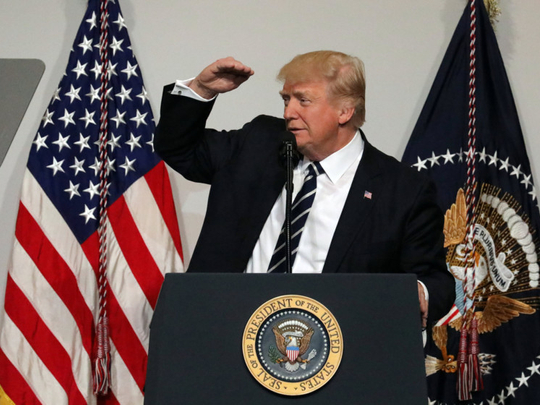
Two weeks ago, Donald Trump tweeted that Barack Obama “had my ‘wires tapped’ in Trump Tower.” He has yet to produce evidence supporting the allegation, and last week, his press secretary, Sean Spicer, retreated from the claim by referring to “wiretapping” in air quotes. Because the mention of wiretapping in the tweet (in reality, just one of the mentions in a series of tweets) fell between quotation marks, he argued, it could mean many things, not necessarily a literal wiretapping.
Soon after, Trump echoed this point on Tucker Carlson’s show: “Nobody ever talks about the fact that it was in quotes, but that’s a very important thing.”
And just like that, Trump co-opted irony.
I’ve been mildly obsessed with air quotes and their cousin, scare quotes, for years. They are typically used when a term appears in quotation marks for reasons other than being a direct quotation, as when many newspapers first wrote about the “alt-right.”
As The Atlantic’s Megan Garber notes, they indicate “epistemic uncertainty.” Garber added, “They take common ground and suggest that it might, but only just ‘might,’ be made of quicksand.”
We use air quotes for many reasons.There’s the conspiratorial use, as when Trump questioned Obama’s legitimacy by referring to him as the “quote ‘president’” during his campaign. That, you might say, is old-fashioned, street-fighting politics. There’s the self-subverting air quote, as when the Chicago White Sox manager Ozzie Guillen said, after using slurs against gays in 2006, “I will apologise to the people I ‘offended’.”
When quotes backfire
Then there are the times when air quotes backfire, seeming to reveal something otherwise hidden about the speaker’s meaning. Consider the criticisms of Senator John McCain who, while discussing abortion in 2008, air-quoted “health of the mother.”
In the 1990s, the Saturday Night Live comedian Chris Farley had a skit in which he made fun of all of this. “Maybe I’m not ‘the norm’,” he said. “I don’t ‘own a toothbrush’ or ‘let my scabs heal’.” It’s hilarious because he’s doing it wrong. But it also raises the question: If everything is air-quotable, then what does anything really mean?
We didn’t always have to contend with such ambiguity. People may have used air quotes as early as the 1920s, but they really came into vogue in the late 20th century. In a 1989 essay, The Irony Epidemic, Kurt Andersen and Paul Rudnick called air quotes “the quintessential contemporary gesture that says, ‘We’re not serious.’” Earnestness was out. Sarcasm was in. Nothing meant what it seemed to mean.
Academia also pushed air (and scare) quotes into use. Perhaps your liberal arts professor threw them in while discussing, say, George Washington as the “father” of our democratic nation.
He would have wanted you to know that he knew what he was saying was absurd — that the idea was a patriarchal fantasy, that no single man could father a nation, especially not a slave holder. The writer Greil Marcus argues that such scare quotes “are a writer’s assault on his or her own words.” They signal writers’ fears, he says, of the very words they’re using. I take a softer view. To my mind, air quotes serve an important purpose. Modern life is complicated, and words have simultaneous meanings. We need a way to acknowledge that. Besides, irony can be fun. It can make us laugh. And we could all use more laughter.
Destabilising meaning
Which brings us back to Trump and his minions. He and Spicer are employing ironic techniques not comically but cynically — to destabilise meaning. As Rudnick and Andersen wrote prophetically, “Air quotes eliminate the responsibility for one’s actions, one’s choices.” In the president’s hands, air quotes are apparently a way to push an alternate reality — one that’s often defined after the fact.
As usual, it’s unclear how much of this is deliberate, and how much results accidentally as the administration scrambles to do damage control. Many others have pointed out that Trump often doesn’t use air quotes properly at all, as when he tweets, “If the press would cover me accurately and honourably, I would have far less reason to ‘tweet’.”
Still, it’s hard to overlook that Trump’s most recent air-quoting supports his basic critique of elites — that we in the media, or in cities, or in blue states, take things too seriously. Of course he doesn’t really grab women’s genitalia. That’s just locker room talk. He “grabs” women’s “genitalia.”
Of course Obama didn’t wiretap. He “wiretapped.” That could mean standing outside Trump Tower trying to hear what’s going on inside. The paradox is that Trump has turned an invention of the urbane and educated against them. He has weaponised irony. Now we may all rue the day when he says, “I said ‘nuke’ them, not nukethem.”
— New York Times News Service
Moises Velasquez-Manoff is the author of An Epidemic of Absence: A New Way of Understanding Allergies and Autoimmune Disease.












